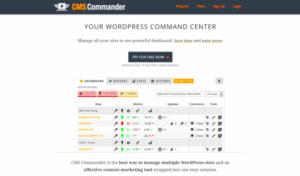When it comes to optimizing your business website for search engines, understanding keywords is crucial. Keywords are the building blocks of any digital marketing strategy, acting as the bridge between what people are searching for and what you are offering. Choosing the right keywords can significantly impact your site’s visibility, traffic, and overall success in online searches.
Think of keywords as the terms that describe your products or services. By integrating these terms into your website, you increase the chances of appearing in search engine results when potential customers look for solutions you provide. Let’s explore why keywords are important:
- Search Engine Ranking: Properly embedded keywords can help improve your site’s ranking on search engine results pages (SERPs).
- Targeted Traffic: Using relevant keywords attracts users who are actively searching for what you offer, leading to higher conversion rates.
- Understanding Your Audience: Keywords can reveal what your audience is interested in, helping tailor your content to meet their needs.
- Competitive Edge: Well-researched keywords can give you insights into your competition’s strategies, allowing you to refine your own approaches.
- Content Creation: Keywords guide your content strategy, ensuring you create valuable and relevant information that addresses your audience’s questions.
Types of Keywords to Consider

Now that we understand the importance of keywords, let’s dive into the different types you should consider for your business website. Each type of keyword serves a distinct purpose and can influence how audiences engage with your content. Here’s a breakdown for you:
| Keyword Type | Description | Usage Example |
|---|---|---|
| Short-Tail Keywords | Broad terms typically consisting of one or two words. They have high search volume but can be highly competitive. | “Shoes” |
| Long-Tail Keywords | More specific phrases, usually three or more words. They attract targeted traffic and often result in better conversions. | “Best running shoes for beginners” |
| Local Keywords | Search terms that include a geographic location. Essential for businesses targeting local customers. | “Pizza delivery in New York” |
| Brand Keywords | Keywords that include a specific brand name. These are valuable for protecting your brand and improving awareness. | “Nike running shoes” |
| Question-Based Keywords | Keywords phrased as questions. These can help you create content that directly addresses user inquiries. | “How to choose the right running shoes?” |
Each keyword type has its unique advantages, and a well-rounded strategy will often include a mix of these categories to effectively reach your target audience. Start incorporating these keywords into your website, and watch your online presence grow!
How to Identify Relevant Keywords

Identifying relevant keywords for your business website is a crucial step in optimizing your online presence. The right keywords will help you attract your target audience and improve your search engine rankings. Here are some effective methods to find those golden nuggets of keywords:
- Understand Your Audience: Start by getting a clear picture of who your target audience is. What are their interests? What problems do they need solutions for? Understanding your audience will guide you in selecting keywords that resonate with them.
- Analyze Competitors: Check out your competitors’ websites and see which keywords they are ranking for. Tools like SEMrush or Ahrefs can give you insights into their keyword strategy, helping you identify gaps in your own.
- Brainstorming: Use brainstorming techniques to list down potential keywords. Think about synonyms, variations, and phrases that relate to your business. This can often lead to discovering long-tail keywords that are less competitive yet highly relevant.
- Use Google’s Autocomplete: Start typing a relevant term into Google’s search bar and see what suggestions pop up. These suggestions are based on what other users are frequently searching for.
- Explore Online Forums and Social Media: Platforms like Reddit, Quora, or specialized forums can provide insights into what questions or topics your audience is discussing. This can help you uncover relevant keywords related to your business.
In summary, thoroughly understanding your audience, analyzing competitors, brainstorming creatively, utilizing Google’s tools, and tapping into online conversations can significantly enhance your keyword identification process. Remember, the goal is to find keywords that align with your business and speak directly to your consumers’ needs.
Tools for Keyword Research

When it comes to keyword research, utilizing the right tools can make your job infinitely easier and more effective. Here are some of the top tools you can use:
| Tool Name | Description | Key Features |
|---|---|---|
| Google Keyword Planner | A free tool that allows you to discover keywords related to your business and see how they perform. |
|
| Ahrefs | A comprehensive SEO tool that provides in-depth keyword data, including ranking difficulty. |
|
| SEMrush | Another powerful tool that specializes in keyword research, competitive analysis, and SEO optimization. |
|
| Ubersuggest | A user-friendly tool that generates keyword ideas and provides insights into traffic and organic search volume. |
|
| Answer the Public | This tool visualizes search questions and suggested phrases based on a keyword, making it great for understanding user intent. |
|
Using these tools will empower you to make data-driven decisions about which keywords to target. You’ll not only find the right keywords but also understand their performance and potential, enabling you to build a solid strategy that aligns with your business goals.
Analyzing Competition for Keywords
When it comes to choosing the right keywords for your business website, understanding the competitive landscape is essential. Analyzing competition for keywords involves assessing how many other websites are targeting the same phrases you’re considering. This analysis helps you identify opportunities and challenges in your niche. So, how do you go about it?
First, use keyword research tools like Google Keyword Planner, Ahrefs, or SEMrush. These platforms can provide insights into the competition level for specific keywords. They often categorize competition as:
- High: Many websites are competing for this keyword.
- Medium: Some competition, but not overly saturated.
- Low: Few websites are targeting this keyword, which may offer a better opportunity for ranking.
Next, perform a manual search on Google. Type in your keywords and analyze the top-ranking pages. Look at factors such as:
| Factor | What to Look For |
|---|---|
| Content Quality | Is the content thorough, well-researched, and engaging? |
| Domain Authority | How authoritative are the websites ranking for these keywords? |
| User Engagement | Are users interacting with the content (comments, shares)? |
This analysis will help you discern how difficult it might be to rank for specific keywords. Remember, it’s not just about traffic – it’s about attracting the right audience who can convert into customers.
Incorporating Keywords into Your Website
Once you’ve identified the best keywords for your business, the next step is incorporating them effectively into your website. This isn’t just about stuffing them into every paragraph; it’s about strategic placement that enhances the user experience and improves your SEO. Here’s how to do it:
1. Page Titles and Meta Descriptions: Make sure your main keywords appear in the title tags and meta descriptions of your pages. This not only helps with SEO but also makes it clear to users what your page is about when they see it in search results.
2. Headings and Subheadings: Use keywords in your headings (H1, H2, H3) to structure your content. This signals to both search engines and readers that these topics are important ones.
3. Natural Integration: Incorporate keywords naturally throughout your content. Aim for a keyword density of around 1-2%, ensuring it flows well and doesn’t read awkwardly. Overusing keywords can lead to penalties from search engines.
4. Image Alt Text: Don’t forget your images! Include relevant keywords in the alt text of images to improve visibility in image searches. It’s an often-overlooked aspect that can drive additional traffic.
5. Internal and External Links: Use keywords in anchor text for internal links to other pages on your site, as well as when linking to credible external sources. This not only helps with SEO but also enriches your content.
Incorporating keywords thoughtfully will help search engines understand your content, making it easier for potential customers to find you. Balance is key, so focus on providing valuable content while aligning with your SEO strategy!
7. Monitoring and Updating Your Keyword Strategy
Once you’ve implemented your keyword strategy, the work doesn’t just stop there! Regular monitoring and updating are essential to ensure that your keywords remain effective as your business and industry evolve. The online landscape is continuously changing, and keywords that once drove traffic may lose relevance over time. Here’s how to stay on top of it:
- Track Performance: Use tools like Google Analytics or SEMrush to keep tabs on how your chosen keywords are performing. Look for metrics such as organic traffic, bounce rates, and conversion rates.
- Competitor Analysis: Regularly check what keywords are working for your competitors. This analysis can provide insights into new opportunities that you might have overlooked.
- Stay Updated on Trends: Use Google Trends or other keyword research tools to stay informed about trending topics in your industry. This can help you adapt to changing consumer interests.
- Adjust Based on Data: If a particular keyword isn’t bringing in traffic, don’t hesitate to swap it out for something more relevant. The key is to be flexible and responsive to your findings.
Moreover, consider seasonal adjustments, as certain keywords may perform better at different times of the year. Set a routine—maybe quarterly or bi-annually—to sit down, analyze your collected data, and make any necessary updates to keep your strategy fresh.
8. Conclusion: The Impact of Relevant Keywords on Your Business
In the end, the relevance of your keywords can significantly influence your business’s online visibility and overall success. Think of keywords as the bridge between your potential customers and your website. When you choose keywords that accurately reflect what your business offers, you enhance your chances of connecting with people who are actively searching for your products or services.
Here’s why relevant keywords matter:
| Benefit | Description |
|---|---|
| Improved Search Engine Ranking | Using the right keywords increases the likelihood of your website appearing at the top of search results, making it easier for customers to find you. |
| Higher Quality Traffic | Relevant keywords attract visitors who are genuinely interested in your offerings, leading to better engagement and higher conversion rates. |
| Enhanced User Experience | When your content aligns well with what users are searching for, they are more likely to find what they need quickly, which improves their overall experience on your site. |
Ultimately, investing time in selecting and updating your keywords can lead to long-term benefits for your website and business. So keep researching, analyzing, and adjusting to ensure you’re always hitting the mark!



